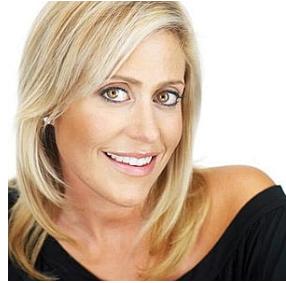 I’d just completed reading “Diary of a Stage’s Mother’s Daughter: A Memoir,” and I was equal parts disturbed, curious and excited to speak with it’s author, Melissa Francis, host of Fox News’ Money with Melissa. To the uninitiated, Melissa was a working child actor of the 1980’s (known then as Missy Francis) who most notably starred on TV mega-hit, Little House of The Prairie. She also helmed numerous commercials and made guest appearances on every 80’s TV show from ALF to Hotel. Older sister Tiffany Francis was a working child actor as well. Their childhood of good looks, talent, fortune and fame, which appear ideal to the outsider, was in reality a daily battle of Star Daughters versus Stage Mother.
I’d just completed reading “Diary of a Stage’s Mother’s Daughter: A Memoir,” and I was equal parts disturbed, curious and excited to speak with it’s author, Melissa Francis, host of Fox News’ Money with Melissa. To the uninitiated, Melissa was a working child actor of the 1980’s (known then as Missy Francis) who most notably starred on TV mega-hit, Little House of The Prairie. She also helmed numerous commercials and made guest appearances on every 80’s TV show from ALF to Hotel. Older sister Tiffany Francis was a working child actor as well. Their childhood of good looks, talent, fortune and fame, which appear ideal to the outsider, was in reality a daily battle of Star Daughters versus Stage Mother.
Some book interviews with Francis have been too congenial, even superficial given the dramatic content of her memoir, and some reviews of her work have been overly-harsh. I’m not reviewing her book here, but rather interviewing Francis for additional insight into her life. Hopefully, this conversation will enhance one’s reading without giving too much of her story away. If you’re a parent, whether of a child actor or not, you should read this book.
I wait for Melissa’s phone call, earnestly wanting to learn more about this person and how she successfully survived her tumultuous childhood in and out of the spotlight.
Hollywood Mom Blog Interview with Melissa Francis
HMB: Obviously your story is very compelling, but what prompted you to write Diary of a Stage Mother’s Daughter: A Memoir?
Melissa: It really came to a head when Battle Hymn of the Tiger Mother [by Amy Chua] reached critical mass and I read about it in the Wall Street Journal like everybody else. I started reading the passages of the book and I just started crying. The idea of a parent emulating that model upset me and terrified me so much.
You know, I feel like I am the product of the extreme version of that tiger mom, the Hollywood version of the tiger mom which is a stage mom. I wanted to warn parents that that type of unrelenting parenting [can make] some children disciplined, focused and successful to the outside world, but [that parenting method] can be completely, wildly destructive to other kids, like [it was to] my sister. It can rob children of their feeling of value and their identity when they are not able to please the tiger mother. I was lucky because I was able to please the stage mother, but my sister wasn’t and it sent her into a devastating spiral. I felt none of that potential downside was represented anywhere in [Battle Hymn of the Tiger Mom] and I have lived it and watched a child die because of it. I felt I had to tell my story and tell people how it may turn out before they decide to behave that way.
Melissa recalls a moment from Chua’s novel that was almost identical to an event she experienced with her own mother when she struggled in a high school chemistry class and worked diligently to raise her grade.
Melissa: I got to the part [in Tiger Mom] where Chua puts the mother’s day card in the trash– because [her child] could have made her a “better” card. This is one of the reasons why I told the story about getting that grade in chemistry. I killed myself for that grade. On my own and you know, devoted all my waking time to training through this class.
Melissa’s final class grade, a highly respectable A-, sent her mother into a rage.
Melissa recounts, “She threw the report card at me in the same motion as the tiger mom [does in Chua’s book] and said, ‘I’m so disappointed. You almost got a B+.’ And at that point, I didn’t feel bad about myself. I just thought, “You’re insane.” Luckily I was 16 years old at that time, and had my own identity. I knew in my heart what an accomplishment [that A-] was and the fact that she didn’t think so, didn’t bother me.
Melissa: I realized at that moment that [my mother] was really insane. But that same type of response [from my mother] affected my sister [differently] and [made her feel] she was [not] worthy and it destroyed her. She carried that [emotional burden] and disapproval with her everywhere she went. I think that the Tiger Mom is extremely dangerous and that’s what I wanted to demonstrate to people.
HMB: Something that came up for me multiple times while reading your book, was your remarkable internal fortitude. Do you think that quality is just innate to who you are? That it’s the way you were born?
Melissa: I think it’s a combination of things. And actually there are a lot of people who have asked me that question. I think some of it is innate. I think my sister and I were just born “different.” I see that now [because] I have two very different sons, that were born very differently. They respond completely differently to the same circumstances and to the same parenting. The same encouragement and discipline has a totally different impact on each of them. I know that we treated them the same, that they were just born different. So from the parent’s perspective, kids are just hard-wired differently. That was for sure the case with my sister and I. I [also] think that a lot of my success comes from having had success early in Hollywood and in school.
HMB: So there were some positive outcomes you can attribute to your years as a child actor?
Melissa: I hope that the book kind of demonstrates [for instance, the positive effect of my mother] telling me all the time that I was the best and that if I didn’t get an “A,” it was because I didn’t push myself hard enough, because I was at least as smart as anyone else. A lot of that had a positive impact. I think that’s what makes sense about being a child actor – the confidence [building] part of it. When you [book a job] you do feel invincible.
I think part of it is just the unique way that I was born in that I’m just a resilient person.
And part of it is early success that made me believe in myself so that when things went wrong, I could go back and sort of draw upon early success that I’d had and say, “Well, I know I can do it, so if it’s not working out, this is not the right situation,” or you know, “I’m not on the right path.” And I think in terms of my relationship with my mother, I think that at some point I just looked at everything. I had an awakening, and realized that she was sort of crazy. I needed to figure out how to get away [from her] and how to have my own life. And [watching her relationship] with my sister, showed me that I didn’t want to [emulate] that. I watched [the dynamic between my mother and sister] unfold and I thought I need to escape this person’s iron grip and just relentless manipulation and make a real life for myself or you know, I’m never going to make it.
In addition to her on-camera childhood, a repeating theme in Melissa’s memoir involves money; the money she earned during her childhood, the money she had to earn in her late teens and early twenties to finance college and the money her mother controlled, squandered and eventually hoarded from the entire family. I point out the obvious irony that given her life experiences, she is now an on-camera money expert, with her own television show dedicated entirely to the matter of finance, and she admits that it was not a conscious decision.
Melissa: Until I really started doing interviews about the book, I somehow didn’t manage to make that connection. It’s always hard to be – to look at yourself. I mean, it goes even further, I married somebody in finance. I married somebody who is an expert at rowing wealth and investment and making money grow rather than [squandering it]. I majored in economics and I have a whole show about money, [sic] so it’s just amazing that I didn’t connect those dots. I had written a book and I still didn’t [connect it]. It wasn’t until I went out and started promoting Diary of a Stage Mother’s Daughter that I realized how funny and ironic and very tragic that it is, but I guess we all work out our own issues.
HMB: It’s fascinating that you took both the negative and positive from your childhood experience and channeled it completely into the positive. I’ve seen other people do this as well and why some people thrive and overcome their past while others don’t or can’t is a great mystery, you know?
Melissa: Yeah. I think that’s a part of [what I’ve learned]. I’ve had so many people reach out to me [since the book’s publication] and that has been the most shocking and heart-warming. This journey has changed my life, but it’s changed my view on the whole population of the planet because I’ve had hundreds of people reach out to me in written letters and e-mails supporting me and saying you know, ‘You’ve been through so much, I just have so much respect for your strength and I have been through this [also].’ And they share their experience and how they overcame it. I think in listening to people and their stories and comparing them to my stories, that some of us are hard-wired to be resilient against abuse or disaster, major setbacks or hurdles, devastation and somewhere [within] have the ability to get up and keep going [in spite of it all]. I think it’s something you’re born with, fortunately or unfortunately. You can hone the skill and you can try and get better at it but hopefully, if you’re not naturally good at it, you have someone to lean on.
HMB: After what you’ve been through [as the daughter of a controlling stage mother] I would imagine that [the term] “Stage Mother” has only a negative connotation for you.
Melissa: You know, in a way, it makes me laugh because we were never allowed to say that term. My mother would react violently. She always told us that it was something that people said or called her who were jealous of what we had and what we had created. She always told us that and there’s always grains of truth in these things. That’s how you get sucked into [believing] them. We were told that we were so lucky to have her because she devoted her whole life to us. And she really did: taking us on auditions, figuring it out, teaching us the lines, getting the right outfit for the audition, driving us, the money that went into finding the right agent and head shots for both of us [all] before we were ever making any money.
There were many years that she spent what [my sister and I earned] on us, trying to get us there before I was very successful; on acting coaches, everything. She dedicated so much of her time and effort and consciousness to this [goal]. What I did not see at the time was how unhealthy that [behavior] is. You know, I thought that was devotional love. I didn’t realize that that’s [the behavior of] someone who doesn’t want to look at themselves. So, when I hear “stage mother,” I think that … I think Hollywood gets too critical because it isn’t – it isn’t bad for kids to be in entertainment at all. I think that [being in entertainment] taught me the value of hard work and the reward of a job well done.
Melissa Gilbert and I had dinner recently and she was talking about how she thinks one of the big reasons none of the kids [on Little House on the Prairie] ended up badly is because Michael Landon [as a role model] was such a hard worker. I say in my book that Landon was, “a combination of God and Santa Claus.” And he really was. He was so larger-than-life, had so much charisma. He was just a magnet to everyone on the set. And as fantastic as he was, he was also an incredibly sure business person. He owned every bit of that show. He wrote it, he executive produced it, directed it, and he acted in it. He made every dollar count and was adamant that we all show up on time, rested, hair brushed, ready to work and he did not tolerate it if we didn’t know our lines, andour marks. [Michael Landon] never treated us like kids and as a result we didn’t [view] ourselves as kids. We saw ourselves as workers, as actors. We felt the reward of a job well done in the pride of earning our paychecks. And as ridiculous as that sounds, as a kid it made me so proud of working, succeeding and of turning in an honest day’s work. And I think that that affected us.
So [yes] I think that being a kid in Hollywood can be really positive. The problem is, are you prepared for when it doesn’t work out? Everyone says that, but they never think they’re going to be the one that it doesn’t work out for. I will give my parents a lot of credit [in that regard]. I mean, my tiger/stage mother was so competitive that we had to be number one in everything, and one of those things included school. And my dad, he always felt like acting was a hobby and it was cute and charming that we did it, but that acting was something my mom wanted us to do [like] the equivalent of ice skating or horseback riding and all the other activities we did. At the end of the day, our job was school. [His feeling was] your real job is school and you need your straight A’s all the time. And if you don’t, you’re not going to act anymore; I don’t care what your mother says, you’re not going to go do that. And you know, my mother said too, “When the time comes, you will go to college. And Hollywood, if that’s what you want, will be waiting for you or you can go to Stanford and you can come back and you can go on auditions. It’s not either or or, but you will go to college.” So I think I was lucky enough that they did realize that about the industry at a time when no one else did. Now it’s so much more fashionable for people to you know, go into Harvard or wherever, there are a lot of kids that do that. But at that time, no one did.
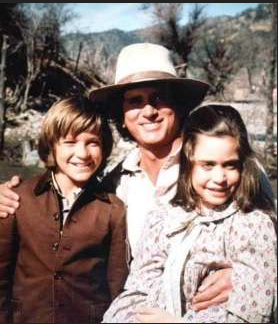
Melissa recalls, “Landon was a combination of God and Santa Claus…he really was. He was so larger-than-life, had so much charisma. And as fantastic as he was, he was also an incredibly sure business person. He owned every bit of that show.”
Francis shares that one of the most shocking stories in her book for former “Little House” co-star Melissa Gilbert was that in order to get through college financially, she worked in food services chopping vegetables for minimum wage. It was her extreme work ethic, instilled by Landon, that allowed her to perserveer when many child stars may not have.
Melissa: That’s one of the big problems, [the former child star mentality of] “I can’t go wait tables, I’ve been a star.” I was so focused on what was next, that I was going to do anything to get there, but most Hollywood kids are not because they’ve already had such financial success, [and think] “Why would I go backwards and work for minimum wage?” But every job where you earn a paycheck is valuable and you should be proud of it.
HMB: Yes, absolutely. The other thing that Michael Landon obviously did well was he helped cast all of you. You’re all clearly very intelligent. You were very intelligent children and you’re intelligent adults. I’m fascinated that you, Melissa Gilbert (Prairie Tale: A Memoir) and Alison Arngrim (Confessions of a Prairie Bitch) have all written books. Do you find that strange?
Melissa: Yes. I didn’t even realize [we all had written books] because I’ve been sort of out of the loop. I saw Allison when I was working on the Today Show and she was doing the tour for [Confessions of a Prairie Bitch]. And I remember Melissa’s book, but it was when I really sat down to go promote [my own book], that I had the realization. I mean, everybody had gone out on their own and had written a book about [our childhoods] and I think that’s pretty interesting. And Melissa, she’s a cottage-industry. She’s thought of so many things to do. I mean she’s teaching reality shows, she’s got a cookbook coming out. She’s always doing something.
HMB: I totally see a Lifetime Network Movie in your future. It’s true. The material from the book is perfect for it.
Melissa: I hope so. I hope so.
HMB: It would be fantastic.
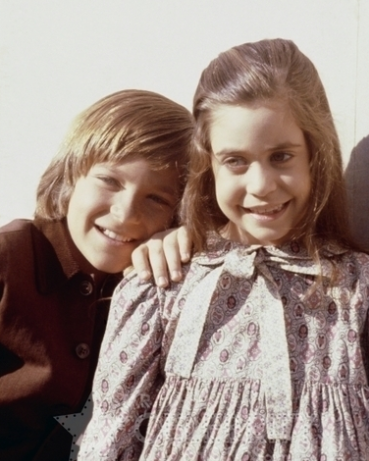
On her co-star Jason Bateman, “I just thought he was fantastic…he was so handsome and charming but I was too young for him to pay attention to. He was so sweet to me, but he loved Melissa [Gilbert] and I loved him.”
I ask Francis if she was aware of the sexual and emotional abuse Alison Arngrim suffered while filming “Little House,” or any of the teen challenges Gilbert faced.
Melissa: No. I was too young. You know, by the time I [was on the show] they were adults. Melissa reminds me that she’s only like 10 years older than me or something. But when you’re eight years old, 18 is much older. They were much older. Jason Bateman was really my contemporary and I had such a giant crush on him. Oh, my gosh. You know, I try to capture some of that in the book but I just thought he was fantastic. I mean, I just thought he was so handsome and charming but I was too young for him to pay attention to. He was so sweet to me, but he loved Melissa [Gilbert] and I loved him. It was really funny.
HMB: A child star love triangle.
Melissa: It was a love triangle. I was this little kid that was with him like a little sister that was following around, but I just thought he was great.
HMB: Do you stay in touch with any of the child actors you worked with growing up?
Melissa: You know, I actually don’t. This book has provided me an opportunity to recap, which has been such a blessing. The Little House family gets together and they’ll do an engagement or something. And I’ve always believed in that. Because I was in such denial of … you know, I had put everything from my childhood in a box in the back of my closet. So they would reach out to me to do things and I would not do it.
Part of writing this book, you asked me why [I did] earlier, was the Tiger Mom thing and another was that when my oldest son was three he asked if my [husband’s mom] was my mom too. And I said no. And the way I said no, he just kind of turned and walked away. He didn’t ask me a follow up question. I asked myself, how was I going to tell my children where my mother was? How could I possibly explain it? I knew I better come up with an answer really soon because he’s here asking.
I warded him off for a day, but I knew I probably had about 24 hours to come up with an answer. I sat down and really thought about it, and I thought, no one in my life knows anything about this. My closest friends have no idea. Contessa Brewer is a news anchor here on New York and we had a show together at MSNBC at the time. And she said to me, I had become a master of “not answering the question.”
[Contessa] would say, “Are your parents coming out for Christmas?” [I’d answer] “Not this year.” I was always able to divert any questions about my family away from really answering them, without drawing attention to it. And she asked me one day point blank, “Where is your mother?” I didn’t really have an answer for her either. And I thought, this is ridiculous. You know, I’m a married woman with children. I need to reconcile myself with all of this. And there’s no reason to hide this like I’m ashamed of something. Everybody has their troubles and their traumas.
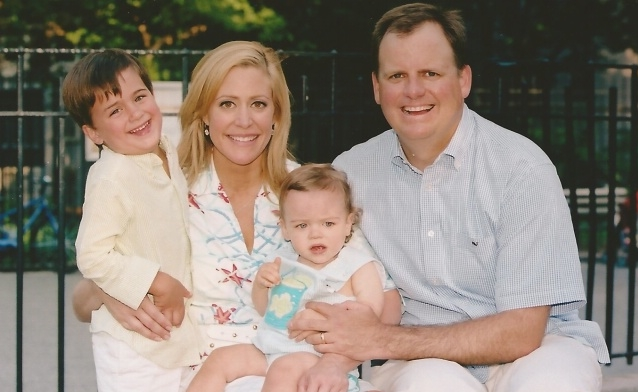
Melissa Francis is now happily married to Wray Thorn and they have two lovely sons of their own. ” I think my sister and I were just born different,” Melissa says. “I see that now [because] I have two very different sons, that were born very differently. They respond completely differently to the same circumstances and to the same parenting.”
What I’ve found is that I regret that I didn’t do it sooner because the tremendous outpouring of love and support from total strangers [as a result of writing the book] has been so heart-warming, not to mention the people in my life [my good girlfriends] who have come to me and said, “I feel so bad that I never knew that you went through any of this.” And I said, “Don’t you feel bad. I feel bad that we’ve been close friends and I know all of your [history] and I haven’t trusted you enough to share mine.” But now I’ve shared it with everyone. It’s such a relief. It’s such a burden that has been lessened.
HMB: Now when you meet people, you can just hand them your book.
Melissa: “You want to have my dirty laundry? Here it is.”
HMB: Yeah. “I don’t want to talk about this. Could you just read my book?”
Melissa: Right, right.
HMB: Or you could send them out with your Christmas card.
Melissa: (laughing) There you go.
In “Diary of a Stage Mother’s Daughter,” Melissa recounts an event in her early child hood when her mother exacted revenge on a neighbor by stealing their elderly pet dog, removing it’s identification tags and collar, and dropping the dog at a far-off animal shelter where it most certainly met it’s death.
HMB: The point in the book for me when I realized that there was something, really, really wrong with your mother was the story that you tell about your neighbor’s dog.
Melissa: Oh, yeah, I know. That scene upset people most.
HMB: Not to make light of the rest. I mean reading that you’ve been, you know, thrown down the stairs and all these horrible things that happened to you and your sister, I don’t –
Melissa: People go like, “Aah, I don’t know. Parents do that, she can be exaggerating.” Whenever they hear the dog story, they’re like, “Oh my god, that is [pure] darkness.”
HMB: Yeah, that’s when the whole Lifetime Movie idea popped into my head. I was like, “Wow, this is just out there!” Have your old neighbors [the dog’s owners] contacted you?
Melissa: No. I changed their name in the book. I’ve heard from people who … I heard from my sister’s Kindergarten teacher who saw the book and somehow remembered that the sister of the child in the book was in her class and then she started to page through it and she was devastated, and started crying in the bookstore when she realized in the book, what happened to my sister. I’ve heard from all kinds of people that I’ve written about, but I have not heard from the neighbor, but you know, I don’t know.
HMB: As dark and awful as moments in your life were, that moment seemed to be a turning point in your relationships with your mother like, “Who is this person? What is she capable of?”
Melissa: Yeah. Definitely.
Conversely, in her memoir Melissa reveals the very loving and nurturing relationship she and older sister Tiffany shared with her father growing up. He was by all measures, their rock and their stability. She lovingly recounts that when he would tuck her in at night, he would boost her esteem with praise for her accomplishments and always told her she could be “the first lady president” if she chose to.
HMB: The one thing I couldn’t glean – I know your father’s still living. And that you’re very close. He’s a part of your life. Did your dad know what your mom was all about?
Melissa: Yes. We’re very close. No [he didn’t know about my mom]. And there’s – you know, there’s a lot of ways to look at that of course. He came from a … they had a very traditional marriage. He ran a small business and worked all the time. He would drop me off at school in the morning and he would come home. Sometimes we were already sleeping. And you know, when you’re running a small business, that is your whole life, you’re the guy who’s in charge. He was at work a lot. And she was in charge of the house and he was in charge of working. He was an old-fashioned guy.
And he said, “You guys were screaming and yelling at each other,” but [he thought] that’s what women do. He thought that that was the relationship that girls had with their mother. He only had a brother and his mother was very old-fashioned. And [regarding] my mother’s tantrums, the highs and lows, he said at first, when he got in a relationship with her, that was exciting to him. But then over time it became a nightmare. He really thought that’s just how women were. He was an engineer, a very smart, cerebral guy who I think just didn’t … I think he didn’t know it. I mean, he didn’t know about the dog. We didn’t tell him. My sister and I would say that we never appealed to him because we knew that we would be alone with [our mother] the next day, which would be a thousand times worse. There was no way out and people who haven’t been in abusive relationships don’t buy it when I say that. But it’s true. You just know that until you’re just physically away from this person, there’s no one who can help you.
People will say to me, you were 15, why didn’t you leave? And I say, “How would I leave, I couldn’t drive a car. How would I even leave? What are you talking about?”
HMB: It’s very presumptuous of people to try to ask why you didn’t do X, Y and Z when you were only 15 years old. It’s just ridiculous. Until they’ve been in those shoes and those circumstances… I can’t even imagine how scary that must have been for you. With your sister having been diagnosed as bipolar, do you think your mom perhaps is also bipolar, and just not diagnosed?
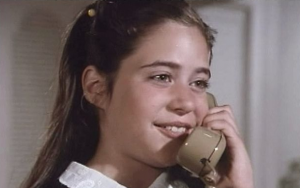
Melissa Francis worked less in her teen years but still managed to appear on every 80’s TV show from “Hotel” to “ALF.”
Melissa: It’s so hard to know. I mean, without question she has always needed mental health attention, obviously. It would be so hard for me to guess specifically what is wrong because she would never go anywhere near a psychiatrist or have any further evaluation and was always very [private] I think for obvious reasons. I’m not sure if she was bipolar because there wasn’t really … I would just say it wasn’t the same as my sister. Many, many people have written to me and said that [my mother] seems like a textbook narcissistic personality disorder, but it’s all sort of [conjecture].
I had hoped very much and I really believed when I told [my mother] in sort of my Dr. Laura moment, that she needed to treat my sister the same way she treated me or we couldn’t have a relationship and that she needed to return the money. But it wasn’t about – it was never about money for any of us; it was that she needed to finally treat my sister like a daughter or else I wasn’t going to let her be a part of my life. I really thought that that would be a wakeup call for her. I really believed that she might finally get help. I thought that I meant so much to her that me saying [what I did] would result [in an epiphany] for her. And to this day, it is so shocking to me that she just turned away and said, “Forget it.” It’s so shocking to me. I believed at that moment that she would go get help. And I wished her … and I still wish her well. People say, just forgive your mother. I did that a long time ago. I’ve only wish that she has found peace and happiness and found the help she needs. But I know she has not. But I always hoped that there would be wakeup call somewhere along the way to go get the help that she needs.
HMB: I watched the Joy Behar show interview you did recently for the book tour. I don’t recall specifically, but I feel like you told Joy that your mom showed up somewhere recently?
Melissa: Yeah. That’s whyI know that she didn’t [get help]– that she’s worse off than she’s ever been. I was at my show on Fox Business Money out in California, because we go on the road, and we do these live shows. And we had promoted that I was going to be in L.A. doing a live show. And she showed up, five minutes before air time.
HMB: When did this happen?
Melissa: It was like the week before the book came out, so it was at the very end of October 2012. She came out and it seemed like, I don’t know. I felt like she had … I don’t think the book was available. It was coming out the next week. It’s possible that she got an advance copy [of the book] and what I really believe is that someone [in the media] was trying to get her to participate in media around [the publication] and sent her one of the preview copies that I had sent to them. Because at that time it felt like a lot of her confronting me had to do with the book [coming out]. Because I had been in California a million times and it was publicized that I was coming. I mean, she had a million opportunities where she could have shown up [prior to that time]. The whole time I was on the Today Show I sort of expected her to be in the audience at one point when I was standing on the plaza and all those people are there.
I would always kind of look around and sort of expected her to be there. So the fact that she showed up the week the book was coming out is too much of a coincidence. I think that the book wasn’t in stores, it was the next week. But we had sent so many preview copies out to media, for stories that I feel like someone may have been trying to reach out to her, to get her comment. I would welcome her opinion and point of view if she wanted to dispute any of it, please. I stand behind everything said. And I don’t, you know, I don’t have any ill will. But anyway, she came out and it was overwhelming. She grabbed at me.
HMB: Oh, wow.
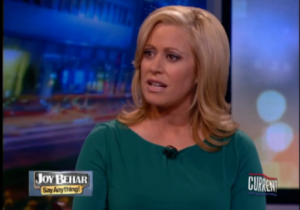
On the “Joy Behar Show,” Melissa reveals that her mother recently made an unannounced appearance on the set of her show.
Melissa: Yeah. We were on this balcony doing the show outside with this beautiful backdrop. She somehow made it past all the security at the hotel. She came right in and she walked over and said, “There you are!” She was crying and she was hysterical. She grabbed at me really hard and shook me. I was so shocked. I froze. I was totally paralyzed. I was so scared. And it seems ridiculous to be scared, I’m an adult, she’s an adult. But it all went back to how many times she had loomed over me. I’m sitting in a chair and she’s standing in front of me and she’s grabbing and shaking me. I was taken right back to just being thrown down those stairs again [as a child]. And I froze right where I was.
I couldn’t even make out what she was saying. She was so hysterical. But as quickly as she came in and physically confronted me, she turned her back and left. My producer, Jill, a very close friend for decades, without my saying anything and from just looking across the patio [at me], knew who [my mother] was and what was happening. She could tell. She raced to go get security but it wasn’t necessary because my mom was gone [sic] in an instant. She came over, she confronted me, she left.
I looked at the clock, it was two minutes to the show. I walked over to the chair I’m supposed to be in, sat down and was like, [deadpan] “Welcome to Money.” You know, it was so surreal. It all happened in a flash. And the fact that she was hysterical and incoherent and came in and grabbed me and then left so quickly and didn’t reappear? To me, she’s more mentally unstable than she’s ever been. It just seemed like it’s probably [become] worse in the ten years that I hadn’t seen her.
HMB: I would imagine, in her own way, she idolized you. And that as shocked as you mentioned that you were, the fact that giving her that ultimatum didn’t force her into some sort of moment of clarity, I would imagine she is tormented by that?
Melissa: I don’t know. I don’t know that she’s tormented. One of the people that has reached out to me [a very famous author] said, “I had a similar mother,” explaining to me the things that she went through [with her own mother] over her academic career and her writing career. And she [told me], “She’s a broken person.” It took her a long time to realize that [her own mother] didn’t love her … she loved the way that child made her feel. And that – whoa – that really resonated with me. People have said to me, “Do you really believe that she doesn’t love you?” And [yes] I absolutely believe that. Not because I’m unlovable. Not because I feel bad about myself. I think she’s incapable of loving another human being. And I think that she loved the way I made her feel when I was successful and winning and doing all these things. She loved the way that felt. And the moment that I turned my back on her and said, “I’m not going to let you have that unless you do this,” then [for her], I didn’t have any value.
I think it’s been easy for her to be away from me. Maybe I make her feel good from afar because she thinks she has something to do with [my current success]. Being with me in person would only remind her that she stole money and turned her back on my sister when she was dying.
HMB: If there was something you could say to Tiffany, if you could talk to her today, and she was standing in front of you, what is it that you would want to convey to her?
Melissa: Oh, gosh (choking back tears). Just how much we loved her, how beautiful we all thought she was. I know she felt like she didn’t have value. You know, she did. She’s left my father and me heart broken. My dad is just still heartbroken and he devoted that whole time in his life just trying to save her and it was just too late. You know, it’s just … it just broke his heart and she – I don’t know if she realized how much we loved her. It’s just I hope now that she’s [at peace and knows how much we loved her.]
HMB: I’m sure she does.
HMB: Many of the people who read Hollywood Mom Blog aspire to the life you had as a child which is probably mind-blowing to you, given your circumstances. I’m hoping that in talking about your story, your experience, your sister’s experience your father’s journey and even your mother’s, that if there are people that are on the same destructive path, that this will be their wake-up call.
HMB: if you do look at it like your mom was/is bipolar, it’s like your success, your career, were her high and her low, right?
Melissa: Right.
HMB: Your sister self-medicated with alcohol or drugs, but YOU were your mom’s drug. You were the most successful drug she had. I hope that there aren’t more moms out there like that. But I know in my heart that there are.
Melissa: Oh yeah. You just look at the Ariel Winter situation. When I look at the details, it’s the same story when people asked, “How could she possibly be abused?” Because she’s showing up for work every day and she doesn’t have any marks? It’s like my mom who always hit us with an open hand, so it didn’t leave a bruise. It was terrifying and hurt like crazy, but when you slap someone as hard as you possibly can, you know, it doesn’t leave a bruise. It’s incredibly painful and menacing to a child. I don’t know, I only know what I read in the medias [about Ariel Winter and mom Crystal Workman] so I don’t know if those stories are true, but they all sounded true to me. You know, it sounded very familiar to me.
And I think that one of the flaws is that people blame the [entertainment] industry for what happens to these kids when various news organizations reach out to me to do interview and they say, “There are plenty of laws to protect kids that are in entertainment.” But [the reality is] their parents don’t follow them. I think that Hollywood attracts this certain type of mom or parent. It could be dads [too], it’s not just moms. But it can attract a certain type of you know, narcissistic, unstable person. It takes a lot to be successful. Parents have to be incredibly clever, resilient, stop at nothing, able to figure problems out, dedicated to a point that doesn’t make sense; and somebody who’s willing to pour all of their energy and all of their focus and all of their hope into another human being. Whether that’s your child or not, that’s not normal, and I think the industry rewards [this behavior].
I think it takes a certain type of mom to be successful in Hollywood, have their child to be successful in Hollywood. Then unfortunately, one out of ten times that’s not a stable person. It’s a person like my mother.
HMB: And then it’s just a platform for which they’re disorder can thrive.
Melissa: Yeah. Exactly. It’s like the perfect vehicle. People say to me, “I’ve seen soccer dads and baseball dads that are as crazy are your mother was.” So I think that Hollywood happens to attract this type of person more often than not but [the syndrome] exists in any sort of competitive atmosphere with children. Unfortunately, a lot of kids who succeed, their whole career is filled by this [parent] because as a kid you need [adult assistance] if you’re going be successful. As a kid, you’re a kid. You can’t even drive yourself. You can’t make these decisions. You don’t know how to plan. So when kids are successful, a lot of times there’s this person behind them who’s [potentially] dangerous.
I don’t know what you do about that. I mean, I don’t know how you solve that problem because you can’t stop [disturbed] people from having kids. It’s a challenge. I can only write this book and hope that more people who have been victims of this type of situation realize that they can do something about it and it’s never too late .
At the end of the day that’s the message that I hope that people take away from this book. This is the number one thing I’ve learned, that every family has a dramatic story. Every person has suffered through something in their life. Rather than letting it paralyze you, it can actually enrich you. I know how not to raise my kids. I know what I don’t want for my life.
I took control of my life and I chose to have a different future. I would just love and hope and pray for anyone that reads the book to feel like they can learn from whatever has happened to them in the past, whatever challenge that they’ve had [that they] can have a joyful future and [sic] choose to be happy. It’s never too late. Today could be the first day of the rest of your life. And that’s what I really hope people get from the book.
HMB: And you could still be our first lady president.
Melissa: No, I don’t know about that. (laughing) That’s a lot of work. I think I’m too tired for that.
If Book Club Members reading this book want to reach out to Melissa Francis through Twitter or e-mail via Fox News, she is happy to answer questions.
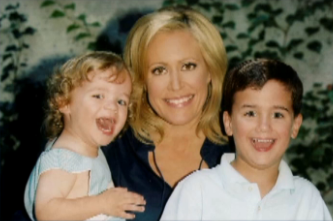
Melissa, pictured here with her own lovely children, says that much like she and her sister, her kids are two very different people.
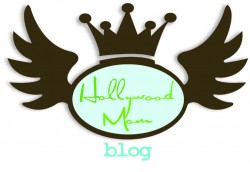
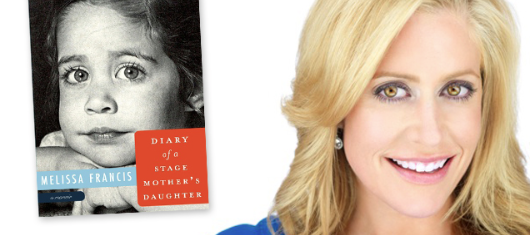
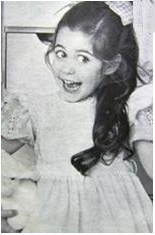
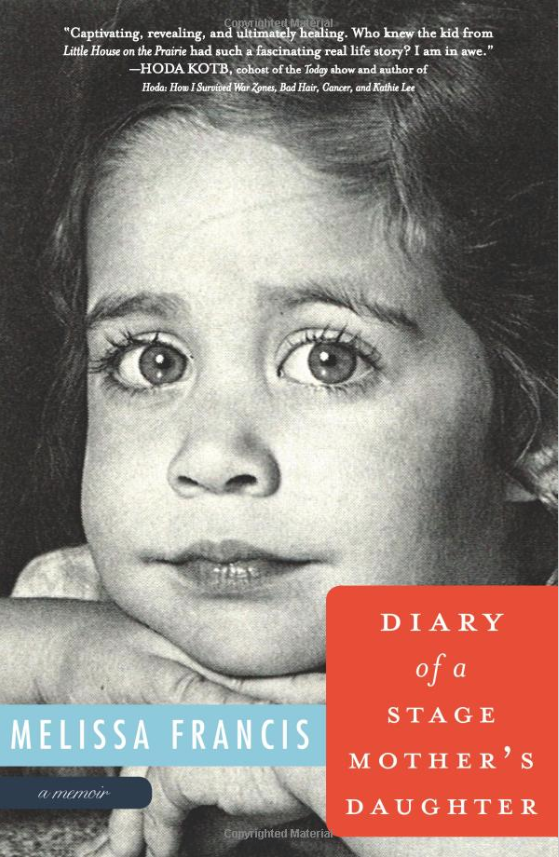
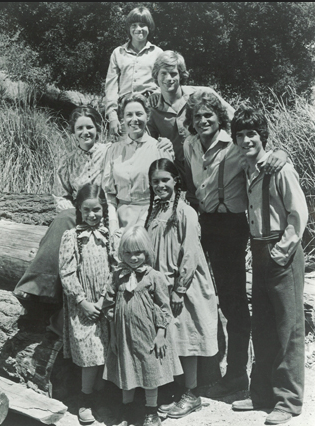
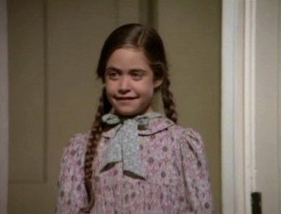
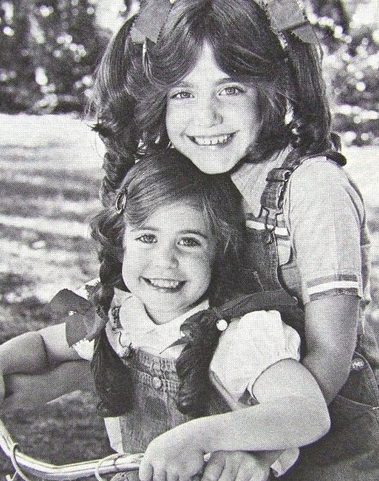
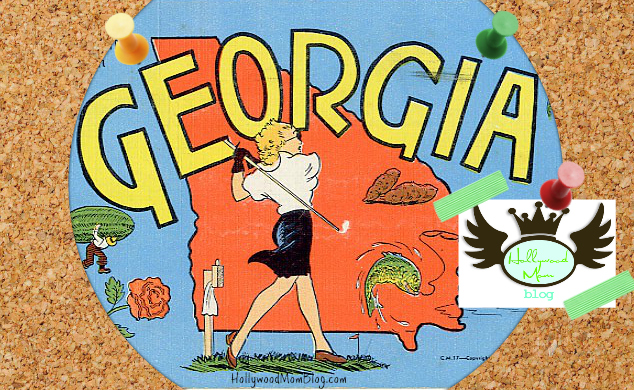
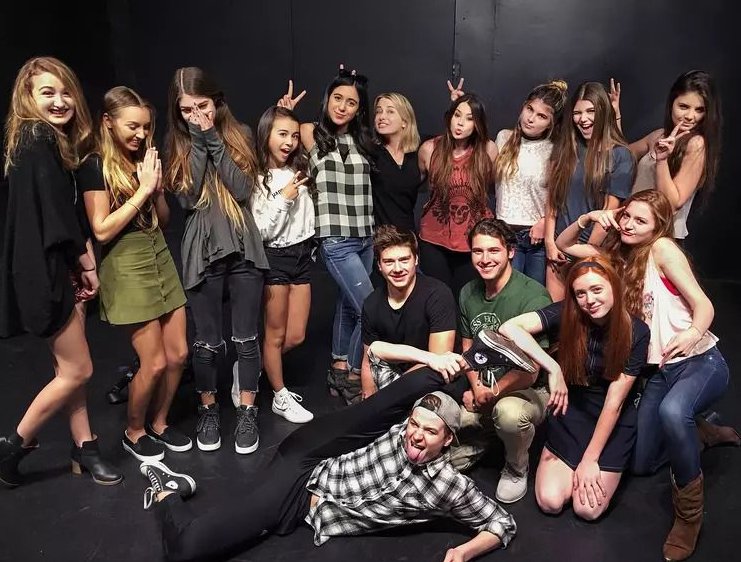

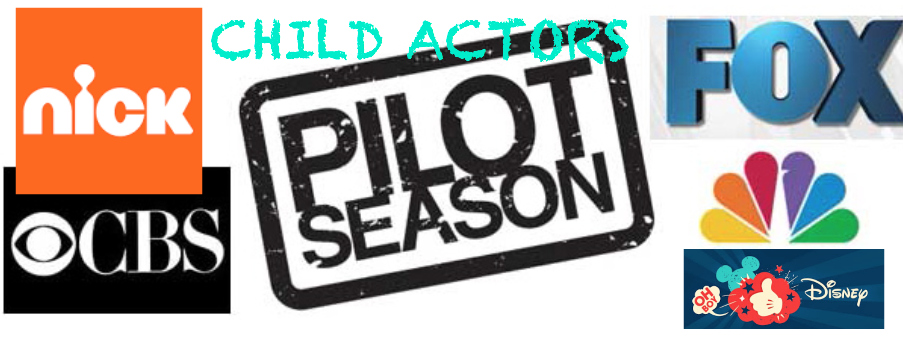


Tracy, this is a TERRIFIC interview.
I’m partway through the book (based on Hoda’s rec) and I don’t find the author very likable … then I read this interview and I find her very likable and relatable. In the book she feels hard. (Maybe I’ll change my mind after I’ve read the whole thing–also, it’s possible that I’m biased by coming from a destructive family situation and not overcoming it to the degree Melissa has.)
Several things strike me here: the Tiger Mom book inspired her to share her story (good! That book could be very destructive), the super-insightful comments about stage mothers (the things she says in this interview are really brilliant, I think), her comments on how her mother didn’t love her (I do believe this), and the way she addresses innate differences. People really are born with a certain type of nervous system and some people spend their whole lives struggling with the panic switch.
A few other things …
(1) The girls didn’t tell their father what was happening. Was this really because of fear of reprisal from their mother? My guess is that this is an indication they understood he wouldn’t do anything about it.
No one wants to believe this. Everyone wants to believe that if a kid asks for help, the help will come. The real world is full of enablers, and sometimes they’re the parent we love and rely on.
(2) I believe that in situations like this, the existence of an older sibling makes the younger child feel safe. Maybe this pops up later in the book, but I wonder if Melissa has ever thought about this? I think–apart from her success in what her mother wanted her to do, apart from innate differences–she had a security pad that Tiffany didn’t. That could be part of her success.
(3) Does Melissa see any similarities between her personality and her mother’s? I get that she’s not crazy, but I do feel there are some.
(4) I lived for a while in the developing world. Most of the children I knew worked; not many went to school. I really appreciated Melissa’s comments in the book on how having a profession and a working life was actually good for her as a child, and that it provided a secure foundation for a lot of her adult accomplishments. I think we’re missing something in America. Children get a real sense of accomplishment from structured time, having family jobs, and being responsible to adults outside the family for some form of work.
Bye now.
(and note … I think Arngrim’s abuse ended BEFORE she started working on LH)
Thank you Karen. Your thoughtful words mean so much more than you know. Best, Tracy